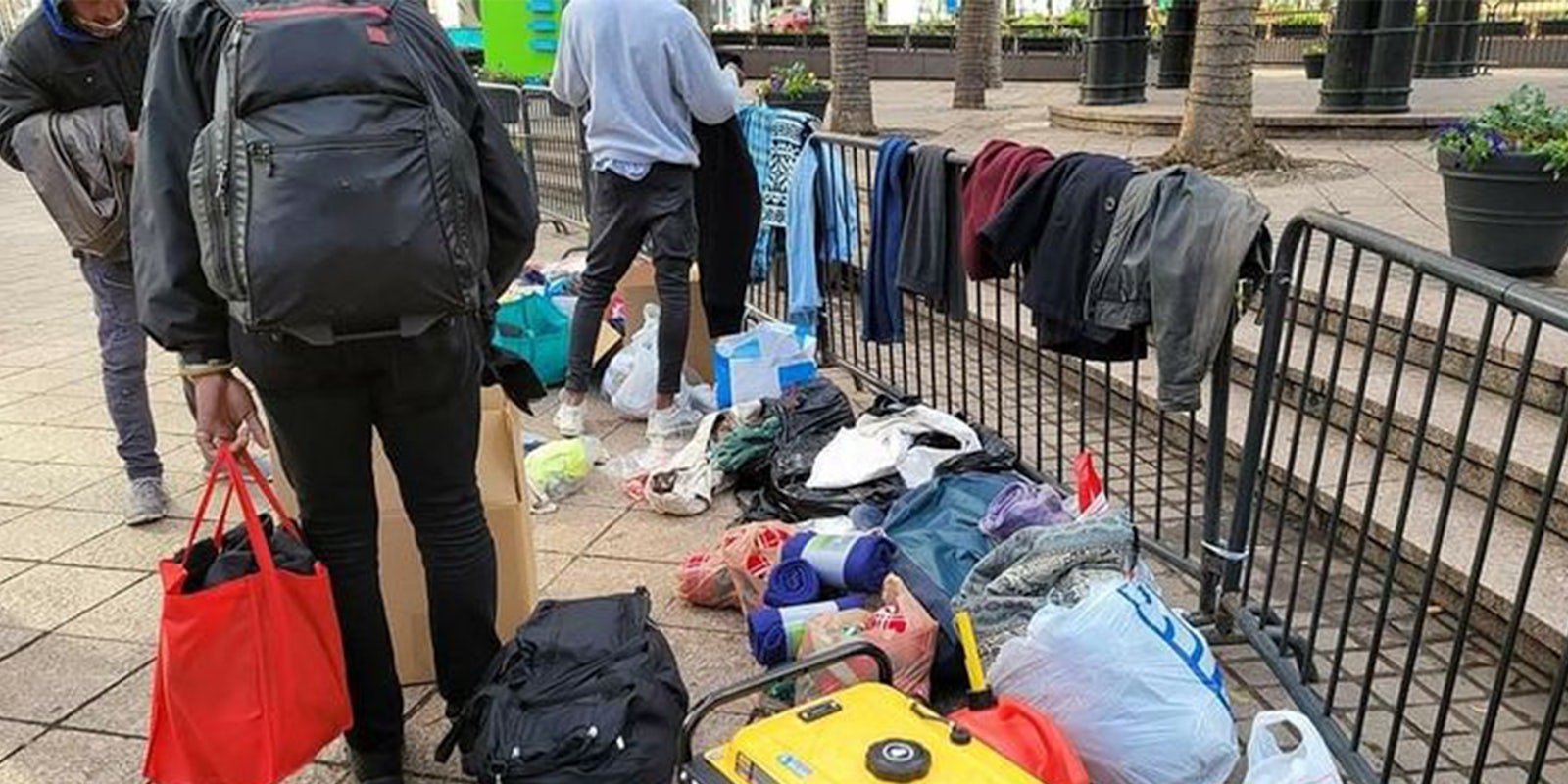The Atlanta Justice Alliance, an organization working to feed houseless people in Atlanta, shared on Twitter on Saturday that the Atlanta government served a warning of enforcement actions to come the organization does not stop helping unhoused people.
The organization says it received the warning letter from the Atlanta Downtown Improvement District (ADID) on Saturday while members were providing food to homeless people in Woodruff Park. The Atlanta Justice Alliance immediately posted a picture of the letter to Twitter and said it will not stop helping the houseless.
“We refuse,” the organization tweeted. “We will be there Saturday, just like we have been all along. Respectfully, kiss our asses.”
According to its website, ADID is a public-private partnership dedicated to “create a livable environment in Downtown Atlanta.”
Ravin, one of the founders of the Atlanta Justice Alliance who asked to be identified by a nickname for safety reasons, explained the mutual aid group was in the park passing out food to those in need when an ambassador rolled up on a Segway and handed them a letter.
“When we actually read the letter, the content of the letter was one thing, but the way they said it was absolutely disgusting,” Ravin said.
Wilma Sothern, the vice president of marketing at ADID, said if the language of the letter was misinterpreted, the organization is open to making changes.
“It was not a forceful letter; it was just handed to groups,” Sothern said. “We have a lot of groups who come to the park to ‘feed.’ I know using the term ‘feed’ has been criticized, but that’s what a lot of groups call it.”
In the letter, posted to Twitter in the aftermath of the event, ADID writes, “Public feedings do not conform to social distancing requirements and pose an immediate public health risk not only to those you intend to serve, but all members of the community.” Ravin said this language dehumanizes the homeless population.
ADID also put up lawn signs in the park warning visitors to “avoid feeding and donating to people on our streets.” The signs say “Prioritize Long-Term Hunger Solutions” but equate the houseless population to zoo animals, Ravin said.
“These people are not shelterless because somebody comes and feeds them on Saturdays, that is not keeping them on the streets in the middle of winter,” Ravin said. “We have been feeding between 150 and 200 people every Saturday pretty consistently.”
The intention of the letter was not to offend anyone or serve as a threat or official call to action, Sothern said, adding that ADID will not take further disciplinary action.
“If they want to continue feeding or providing meal service, at least for the immediate future, they will do that without any immediate interference from us,” Sothern said.
According to Ravin, the mutual aid group offers masks and promotes social distancing and cleanliness as top priorities to keep everyone safe.
“In the letter, they say that what we are doing is putting them at a higher health risk, but their alternative to that is indoor feeding, which is counterintuitive to everything the [Centers for Disease Control and Prevention] has said,” Ravin said.
While the mutual aid group has been offered space inside to offer meals to homeless people, it has continued efforts outside even in winter to prevent the spread of the coronavirus. Ravid also said the organization has a ‘no trace policy’ after every meal.
“There is no food left, there is no trash,” Ravin said. “Just leave us be.”
ADID’s letter also said that no permits are being issued for group gatherings, so the Atlanta Justice Alliance cannot legally serve large groups of people. Ravin said a permit would allocate money that could be better spent on sleeping bags, blankets, and clothes for the houseless.
“We are not selling food,” Ravin said. “Their policy to require a permit is absolutely ludicrous.”
Users on Twitter shared their thoughts on the letter as it spread across the platform this week, receiving 1,426 retweets and 4,443 likes in six days.
“Providing someone in need with necessities for life should not require a permit,” one user wrote.
Others said their cities have similar tactics of pretending to care about the homeless population but really just wanting the problem to disappear.
“Oh wow, sounds like we’ve got some of their cousins up here,” one user wrote from Seattle. “‘I Heart Downtown Seattle,’ and ‘Safe Seattle’ both pose as ‘concerned neighbors’ but it turns out their concern is not wanting to see unhoused people in their communities.”
Atlanta’s homeless population was approximately 3,240 people in Jan. 2020, per the Midtown Atlanta. That population has grown steadily due to the pandemic, according to the Atlanta Justice Alliance. More than 11,000 people in Seattle were homeless in 2019, according to Seattle P-I, due to rising rents in the city.
It’s not yet clear how devastating the effects of the coronavirus will be on unhoused people across the U.S. But as Wired reports, rates of homelessness prior to the pandemic were already the highest in the country they had been in 20 years.
“A lot of these people, their houseless situation is new because of this pandemic and to treat them like vermin is reprehensible,” Ravin said. “These unhoused people are their citizens. The fact that we are providing them with something that could give them comfort for even a couple hours when we are not hurting anybody.”


